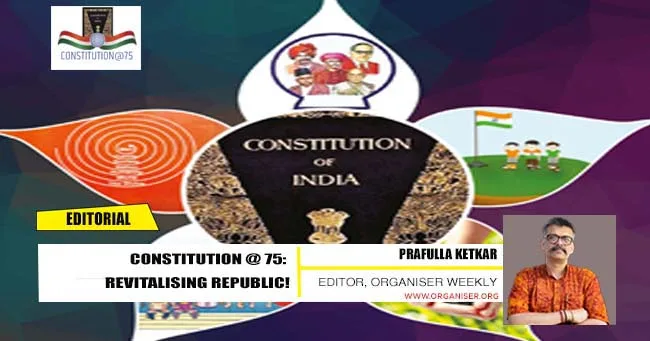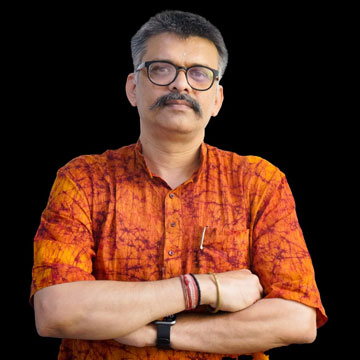“This is an occasion for heartfelt rejoicing, and we must rejoice in that we are fortunate to be living at this happy hour of our country. But rejoice as we must, our rejoicings should not degenerate into mere merry-making. Time ever marches on. Some parts of the glorious picture of happy Motherland, envisaged by all patriots and martyrs, have been translated into reality. But despite that, the picture remains incomplete. To complete it we must temper our joy of new-won rights in the Constitution with the realisation of the problems that face us today. One crore hungry, homeless, unemployed, sorrowful refugees are in our midst today. Problems of every type face us on every side. To solve them, we must co-relate every right with its inescapable duty. In that alone lies the way to peace and prosperity”.
– Shri M S Golwalkar (Sri Guruji), “Rejoice – for Bharat is Free” while addressing the gathering on the first republic day eve, Organiser (Weekly), February 6, 1950
As our Republic is completing seventy-five years of a new journey after political Independence this January 26, in the coming months, the movement that started for reorganising the entire society based on the values of the collective national consciousness – Rashtriya Swayamsevak Sangh (RSS) is completing hundred years. Generally, a centenary celebration is supposed to be a pomp show. However, RSS, with its unique thought process and work ethic, has come up with a task revitalising this Republic with the five fundamental areas of transformation. Our national journey as a modern independent republic is inseparable from the evolution of the RSS as a national movement. The five transformative tasks undertaken by the Swayamsevaks should be seen in the same light.
When the entire nation was fighting for Independence from the foreign subjugation with different means, the Sangh founder Dr Hedgewar participated and experienced all the ways – from revolutionary to Satyagraha. He then tried to address the root cause of losing the freedom and his diagnosis was disunity and self-oblivion in the society. As a doctor, not in professional terms but in a national sense, he came up with a solution for sustaining the eternal freedom. He devised a unique way of developing a collective and national consciousness through a Shakha. He was seeing the Independence as imminent in 1920s itself. That is why, he was championing the cause of complete Independence in 1920 which ultimately came into the Congress resolution in 1929. In the last seventy-five years, Sangh has reinvented itself as per the requirement of the society without compromising on the fundamentals it started for – reorganising the entire society for national reconstruction.
Since we adopted the Constitution to be a republic, we as a nation have marched remarkably in sustaining the democratic culture and constitutional values. We could do that not just because our freedom fighters and Constitution makers had laid a strong foundation for the Republic but because our civilisational ethos had been democratic and republican, as Dr Babasaheb Ambedkar had pointed out in his last speech in the Constituent Assembly. Civilisationally, democracy was not merely a political mechanism for us, but with the edifice of Dharma, it was a holistic process to ensure Sarve Bhavantu Sukhinah. Many sceptics had made a prophecy of the inevitable failure of constitutional democracy in a country with little formal literacy and overt diversity. After seventy-five years, we can proudly say that despite ups and downs, we have maintained the unity and integrity of the nation and developed mechanisms to resolve the issues through constitutional means. On each step in this journey, Sangh, as a movement, played a constructive role in marshalling the energy for the national cause.
When the people were facing the horrors of Partition, Sangh Swayamsevaks became the saviour of the refugees by running refugee camps and raising their issues through public awakening. When Jammu-Kashmir faced external aggression, Swayamsevaks supported the Armed Forces. During every natural calamity, Sangh has created volunteers who would rush to the problem area without waiting for orders and offer a helping hand in the best possible way. When language became the divisive factor, RSS Sarsanghchalak Shri Guruji Golwalkar took a stand and called all Bharatiya languages as national languages. Whether wars or providing education and healthcare in the Northeastern Bharat, selfless Swayamsevaks made a noticeable contribution with a sense of duty. Emergency was the darkest period of Bharat’s democracy; Sangh came out to mobilise the masses, giving them strength amidst atrocities and ensuring restoration of democracy and constitutional values. From Somnath to Ayodhya, considering cultural resurgence and pride as the fundamental values of national reconstruction, the inspired organisation brought all sections and regions together with the collective spirit. From education to economics, from arts and culture to healthcare and agriculture, providing a Bharatiya perspective through societal organisations and projects has been the Sangh approach. Thousands of service projects with social contributions are serving everyone with compassion and a feeling of brotherhood. What can be a better way to nurture republican values than this?
In tune with the aspirational population with ancient roots, Sangh is not satisfied with what we have achieved. The ultimate goal is to fulfil the national mission of spreading the message of harmony for the entire universe. Taking a nation to the pinnacle of glory is the means and not the ends in itself. To attain this objective, the revitalisation and sustenance of the republican values is a precondition.
The Panch-Parivartan – five action programmes for the national transformation – propounded by the RSS is nothing but a constructive step in this direction. Through a participatory approach, Sangh seeks to nurture the sense of Swa – selfhood – in every aspect of national life. Though we have achieved Independence, the project of decolonisation and renationalisation is not yet complete. Developing a sense of national ethos is the first value of this programme. As Dr Ambedkar argued during the debate on the Preamble to the Constitution, without fraternity, liberty and equality cannot be achieved. The sense of brotherhood and harmonious relationship is the bedrock of a vibrant republic. Hence, Samarasata – social harmony or equality with fraternity – is the second core value. Family is the institution that has been the core functioning unit of the cultural continuum called Bharat. In the changing economy and technological intrusions, the family institution is undergoing rapid changes. How to retain the core of family while adapting to the new situation is the third concern we need to address. Sustainable development is a global challenge, and we have the civilisational wisdom to provide the solution. Unless we change our habits and become sensitive towards environmental degradation, Bharat cannot fulfil its role as a global solution provider. Nurturing an environment-friendly lifestyle is the fourth dimension of this programme. All this is possible only if we have a sense of duty towards others, as expected in our Constitution, along with demands for rights. As Sri Guruji guided in the first Republic Day programme, to solve the national problems, ‘we must co-relate every right with its inescapable duty’. Hence, inculcating a sense of civic values for the personal and collective good is the fifth aspect that we need to work on.
Father Anthony Elenjimittam in his seminal work Philosophy and Action of the RSS for the Hind Swaraj, considered the Sangh as the true carrier of Gandhi’s ideal of Hind Swaraj – the idea of the Bharatiya Republic or what Gandhi had called Ram-Rajya. Father Elenjimittam said, “The new Sangha that is born is the crowning and fulfillment of all that is best in Hindu and Buddhist traditions with its hands outstretched to receive with critical acumen all that are great and bright in other civilisations also”. Introspective and self-corrective society, to draw best from the past, to meet the challenges of the present, to fulfil the destiny of the nation is the symptom of living republican culture. Bharat was fortunate that someone resurrected from the masses to restore the Dharmic values whenever there was some regression. Sangh is nothing but the modern manifestation of that civilisational process. While celebrating the Amrit Mohotsav of our Constitution, we should join the centenary process of revitalising the republican values of Bharat, for Bharat, by Bharat.




















Comments